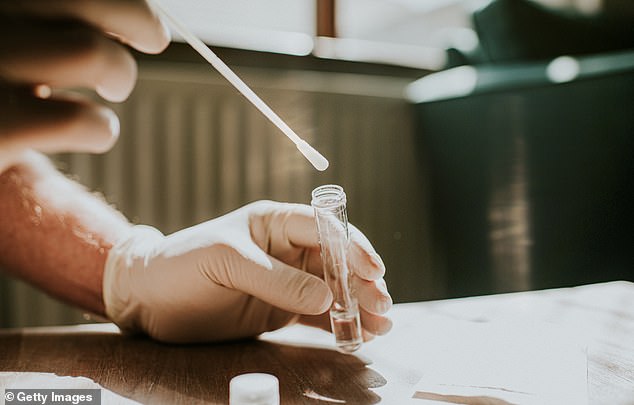DR. PHILIPPA KAYE: It’s an extremely intimate act that a third of couples do… but few admit it. As a doctor, I believe we MUST talk about it so women can stay safe and injury-free
Dr. Philippa Kaye, GP with special interest in women’s health and sexual health
It’s a topic that many people will feel uncomfortable reading about: anal sex.
Some reading this might think it’s something extreme, or, to put it delicately, extremely niche.
But that is not it. The National Survey of Sexual Attitudes in Britain recently reported that almost 30 percent of 16 to 24 year olds participate in heterosexual anal sex.
And this came as no surprise to me. As a GP with a special interest in women’s health, I often speak to female patients of a wide range of ages about this subject.
This often happens when things don’t go exactly according to plan.
Common problems include anal fissures, which are small tears in the anus that can be extremely painful and bleed.
In the worst cases, women can develop continence problems due to damage to the muscles that help us ‘hold on’.
And then there are sexually transmitted infections (STDs): younger women have unfortunately told me about partners who insist that condoms are not necessary for anal sex because there is no risk of pregnancy.
But of course there’s the risk of getting everything from the easier-to-treat gonorrhea to the trickier, incurable genital herpes and even, albeit rarely, HIV, which still occurs.
My biggest concern, however, is that there are many women who, out of shame, do not come forward for help and advice when they are experiencing anal problems.
I’m not alone: a recent editorial in the British Medical Journal discussed the importance of doctors having open conversations about anal sex to meet women’s needs.
However, it’s important to point out that I’m in no way suggesting that if you want to have anal sex, don’t do it. Quite the opposite.
My message is: if you want, you can enjoy anal sex safely.
And with this in mind, here’s my simple guide to the steps you can take to make it less painful and reduce your risk of injury…

Anal sex can mean anything from external touch to penetrative anal sex with a finger, sex toy or penis, according to Dr. Philippa Kaye
Prepare yourself, start slowly and don’t forget the lube
Anal sex can mean anything from external touch to penetrative anal sex with a finger, sex toy or penis. Whichever way you want to do it, follow these steps.
Preparation: There are many ways people prepare for anal sex, but it is not always necessary.
Although the rectum is where stool is stored just before you go to the toilet, it is not constantly full unless you are constipated (keeping your gut healthy with plenty of fiber and exercise is the best way to prevent this, but if it is a real problem you may need to talk to your pharmacist).
I’ve seen some guides online that suggest we prepare for anal sex by using laxatives and anal douching – using a small squeeze device that fills the rectum with water to clean the area. But these things are really not necessary.
In fact, anal douching can irritate the lining of the rectum and is associated with a higher risk of contracting an STD.
I completely understand that some people prefer to shower before anal sex, but if you are going to do this, you should wait at least an hour after showering to try to give yourself time to recover from any irritation.
Others choose to use a toy first to check for stool, but this is also not mandatory.
Start slowly: To avoid injuries, it is important to start slowly. You might decide to do this by using sex toys or dilators of increasing size so that you can work your way up to it gradually.
You can do this in advance; some people suggest building it into your daily routine, in the shower.
But if you use sex toys like butt plugs, make sure you use a toy with a flange so that it cannot be sucked in and can be removed easily.
3. Use a condom and lubricant
Although there is no risk of pregnancy with anal sex, you should always use a condom.
This is because condoms prevent both the transmission and infection of sexually transmitted diseases.
I also tell patients to use an appropriate lubricant because the anus cannot produce the same amount of lubrication as the vagina.
It is best to use silicone or water-based lubes because oil-based lubes are not compatible with condoms.
If you have both vaginal and anal sex, always use a new condom after anal sex and before vaginal sex. This helps prevent bacteria from being transferred from the rectum to the vagina, which can cause problems including bacterial and yeast infections.
But if you experience pain or if anal sex causes bleeding, you should stop and have any concerns assessed by your doctor.

There is absolutely no need to bleach your anus, no matter what Kourtney Kardashian or anyone else suggests
Please don’t be self-conscious about what “it” looks like
Anal bleaching – cosmetic treatments that aim to lighten the appearance of the skin of the anus – has apparently risen in popularity after Kim Kardashian’s sister Kourtney admitted to doing it.
But there is absolutely no reason to believe this is necessary.
It is natural and normal for the skin around the anus and between the buttocks to be darker than the rest of your skin.
That’s because activities we do every day increase friction in the area, such as walking or even sweating, and friction increases pigmentation.
I totally understand, some people find it gives them more confidence.
If your partner is pressuring you to lighten your anus, it may be time to consider explaining that this is natural, or putting some distance between you.
Although it’s in the name, there is absolutely no bleach involved: bleach can seriously damage the skin and cause chemical burns.
The creams and lotions used are no different than chemical peels for the face, but are applied to the anus.
This lightens the skin by breaking down the skin pigment, melanin, and reducing the number of cells that produce it.
Lasers can also be used to break down pigmentation and lighten the skin.
Some products can cause a burning sensation and if used incorrectly, this can lead to skin damage and infections.
There are also risks that if the product is applied in the wrong place or if too much is used, it could affect the skin of your genitals.
In some cases it can enter the anus, leading to scar tissue and strictures, which is the narrowing of the anal canal, which can lead to pain when going to the toilet.
Even if the treatment works, the difference may be minimal and only a few shades lighter. You will also need to keep repeating the treatment as it is not permanent.
My advice? Prevent.

Some bleaching products can cause a burning sensation and if used incorrectly, this can lead to skin damage and infections.
…and if you plan on going completely bare there
This isn’t so much a social media trend as it is a fashion trend that has been around for a few years.
Many people remove hair around the genitals, the perineum, around the anus and in the gap between the buttocks through waxing or other forms of hair removal.
But whether it’s Brazilian, Hollywood wax, or more permanent laser hair removal, the hair you remove actually serves a purpose.
The skin around the anus produces secretions that are captured by the hair, increasing lubrication and reducing friction in the area.
Remember that every time you take a single step, friction is created by the movement.
Additionally, these oily secretions help the good bacteria that are part of the microbiome on your skin around the anus. The hair also helps to wick away moisture from sweat.
But really, my fellow women, save yourself the pain of laundry.
Everything you need to know about anal STDs
Anal sex, whether penetrative with a penis, finger, sex toy, or anal oral sex, can carry a risk of transmitting STDs.
But anal sex that involves penetration actually has a higher risk of transmitting STDs than other forms of sex.
That’s because the thin lining of the anus can become damaged and the trauma increases the risk of infection.
If you are sexually active, it is recommended that you visit a sexual health clinic at least once a year for screening – more often if you have symptoms.
During a screening you will be asked about the type of sex you have, such as oral, anal and vaginal, so that appropriate swabs can be taken.

If you are sexually active, it is recommended that you visit a sexual health clinic for screening at least once a year – more often if you have symptoms
Oral anal sex can transmit not only STDs, but also other bacteria such as E coli that can cause gastroenteritis.
STDs include bacterial infections such as chlamydia, gonorrhea and syphilis, viral infections such as genital herpes and genital warts, as well as hepatitis, HIV and parasitic infections including pubic lice, also known as crabs.
Discharge from the anus, rectal bleeding, itching, pain and discomfort when sitting or going to the toilet are all symptoms of STDs. You may also notice lumps, blisters, or sores in the area.
Keep in mind that it is possible to have an STD and not have any symptoms.
To make anal sex safer, use water- or silicone-based condoms and lubricant, and don’t forget regular sexual health exams.
Depending on where you live in the UK, you may be able to have free self-test kits sent to your home, for example from www.sh.uk and HIV testing from www.freetesting.hiv
